The fate of Cinderella offers hope to all of us who have occasionally felt that life is passing us by. Still, when you think about it, a kitchenmaid is better placed in the beauty stakes than your average princess, anyway. She has access to oatmeal, honey, lemon juice, garlic ... and if any wicked queen upsets her, she can soothe her eyes with cold tea, or use a poultice of mashed potato to combat puffiness.
... Link
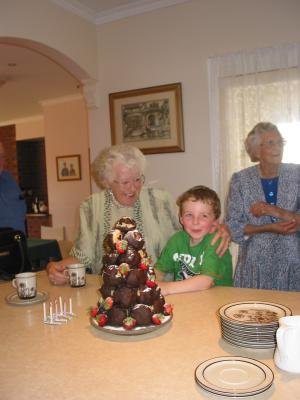
Great Grandma with Great Grandson Devon
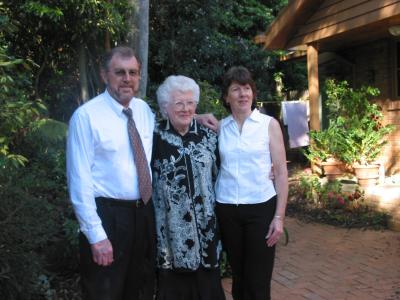
Terry, Mum & Barbs
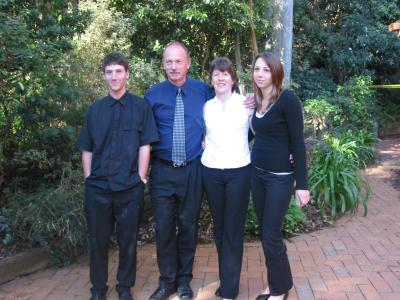
Michael, Kim, Barbs & Tessa
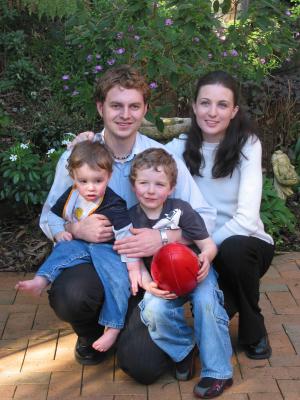
Matt, Jacqui, Hamish & Devon
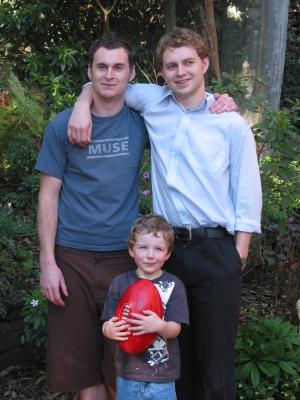
Geoff, Matt & Devon

Hamish
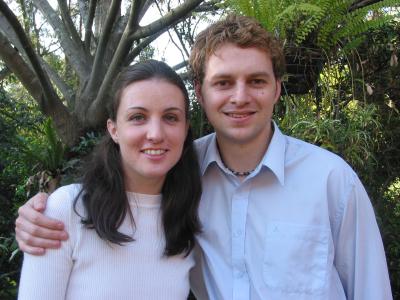
Matt & Jacqui
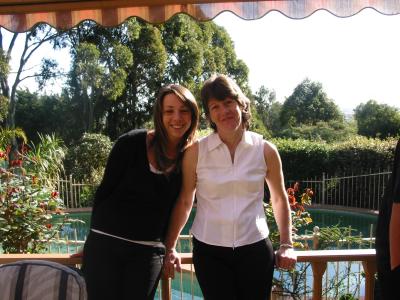
Barbs & Tessa
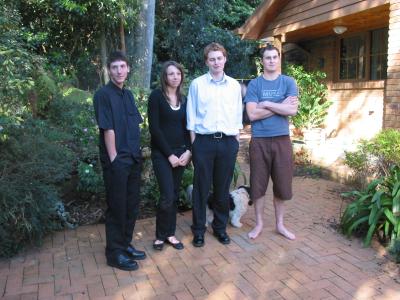
Michael, Tessa, Matt & Geoff
... Link
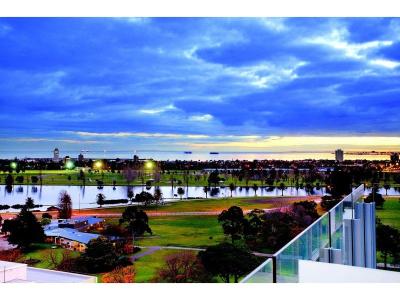
Dusk over Albert Park Lake
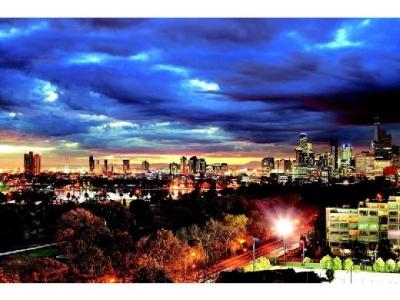
The city alight
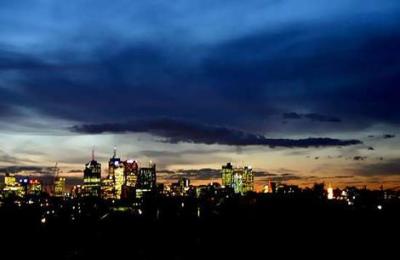
Darkness approaches
... Link
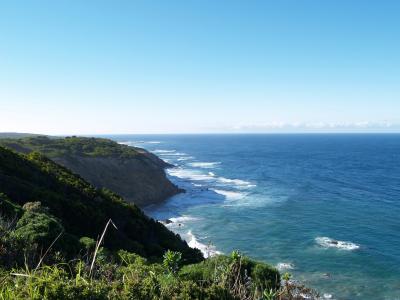
The Great Ocean Road winds along the edge of the open sea for several hundred kilometres and each turn reveals another sight more majestic than the last. The road passes through the imposing Otway Ranges - a virtual wilderness of temperate rainforest, with extensive stands of aged tall timbers and tree ferns, crystal clear waterfalls.
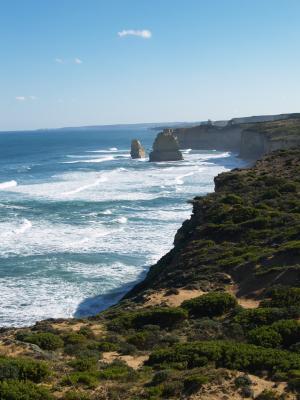
The most famous feature of this wild coastline is the ancient series of rock formations rising beside the cliffs known as the Twelve Apostles. These are the tough remnants of a weathered and sea beaten coastline and stand silent watch over this treacherous stretch.
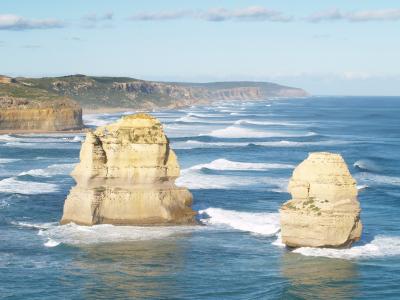
Known as the Shipwreck Coast, there are said to be the hulks of many a pioneering ship lost while trying to make its way to the relative safety of Port Phillip Bay.
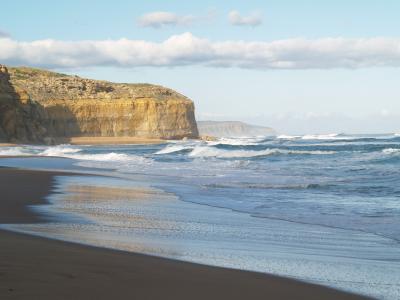
Loch Ard Gorge is named after one such unfortunate vessel and a short climb down the cliff into this gorge brings into dramatic focus the reality of the dangers the early settlers faced.
... Link
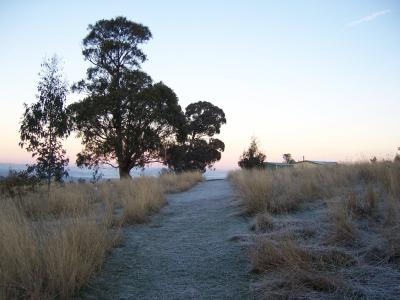
The sunrise burns with a golden shimmer through the bright hard dawn. Mist clings to the land. Light from the rising sun, hazy and weak, shimmers across the crystalline fields .
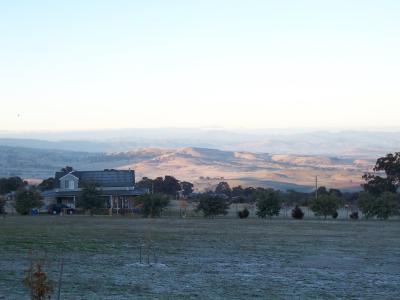
The day becomes bright and sunny, the skies clear, blue and depthless. Opening the window to let in the fresh winter air I hear a bird's soft warble wafting through the trees.
The temperature has risen to almost 16C and the day feels warm against my skin as I pull weeds from the soft damp earth. Sunshine streams down on my face and the smell of newly mown grass rises on a sudden breeze.
Patches of light glisten between the leaves of the gum tree, a tangle of bare stretched limbs web across the blue sky, casting odd shadows on a wintery gray-green grass. It has been a time of sleep and in the warm winter sunshine one can feel the the new season of spring waiting patiently for rebirth.
The sun drops marking the passing of early afternoon. Clouds fill the edges of the eastern sky beyond the tops of the gum trees, drifting over the lower hills and vales and rolling towards Mount Buller. I feel the cold. The sun has slipped all the way below the horizon and the darkness hangs in the sky like an approaching shroud.
The stars appear, low and large trembling. Cold darkness, as a golden moon hangs low in the sky. The cold is hard and brittle against the skin. As the moon rises silver, its light illuminates the stretched limbs of the trees, giving them a silvery sheen. All about the darkness is hushed and still. The night is bitter cold, the damp warmth of the sunny day crystallised into a fine crust that covers the landscape in a frozen sheen which crunches like tiny bells under my feet.
... Link
No modern city stands still. Gradually, each develops places, buildings and landscapes that express their time. Not many years ago, a grand plan for the Southern bank of the Yarra River rose from the ground which is today called Southgate, Southgate has now become a vital part of city life. Locals flock here to eat, stroll, watch others, browse in shops, or just pass the time until the curtain rises at the Arts Centre next door. It's always busy; there's always something going on and it keeps going until the smaller hours. It's become a favoured meeting place and tthere are dozens of places to eat. It is a place for good food and good restaurants.
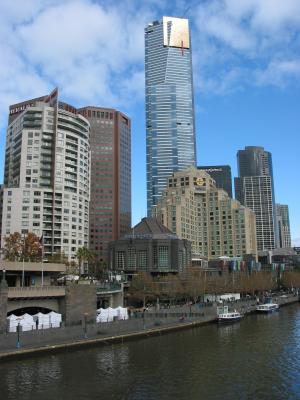
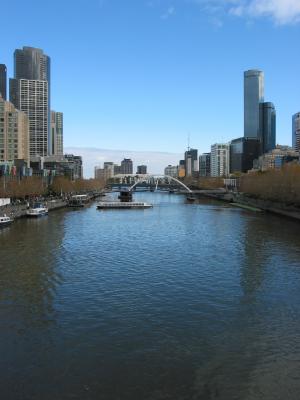
(Melbourne viewed from Southgate)
... Link
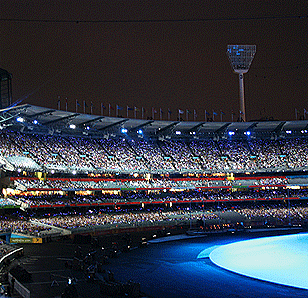
The Melbourne Cricket Ground enveloped in blue
MELBOURNE turned on the magic last night as the Commonwealth Games exploded into life with airborne koalas, a flying tram, ballerinas, bikers and a duck. Eighty thousand revellers at the MCG saw a $40 million sound and light show.
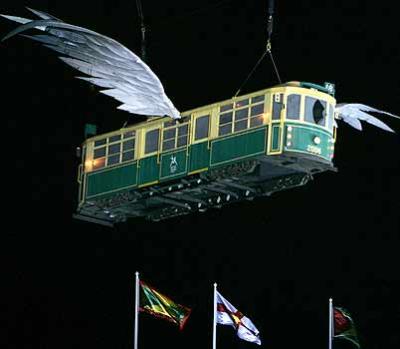
The flying tram
Hundreds of thousands flocked to the city and the banks of the Yarra to see the final spectacular leg of the Queen's Baton Relay.
At the MCG, the Queen declared the Games open, Delta Goodrem sang an anthem for the athletes, opera legend Dame Kiri Te Kanawa sang Happy Birthday to Her Majesty and a cast of thousands soared, sang and danced through a magnificent theatrical show.
Two hundred thousand lining the banks -- 50-deep in parts -- immersed themselves in the magic. Keeping with the fishy theme, they packed in like sardines from St Kilda Rd to Swan.
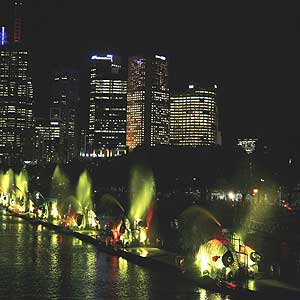
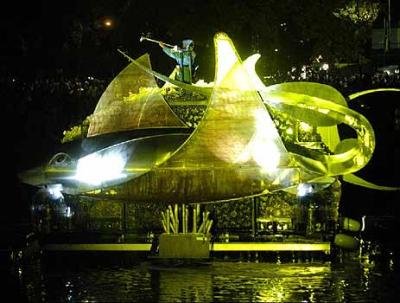
One of the Commonwealth Games fish on the Yarra
Families camped on the grassy banks from around midday, eager not to miss a minute or a sight.
So huge was the crowd, 2km of vantage points was hardly enough. Dinghies patrolled the reeds, security guards the banks to keep over-eager spectators from a Yarra drenching.
Face-painted children, teenagers draped in flags and older folk on camp chairs squeezed on to the Yarra banks.
Huge screens dangled from a crane halfway along, but most eyes were locked on the river as 72 giant creatures burst into life.
Metal scales and what looked like dull patches of mesh sparkled like jewels, lit from the inside. Lights played as water spurted up from the fish and cascaded back down.
The kilometre of the Yarra became a river of fire as orange and red lights bathed eels, dolphins, prawns and sharks.
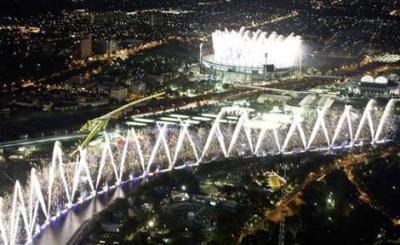



Then, suddenly blue, it became a river of ice stretching from the city's centre to its sporting heart.
Last night the biggest show in Melbourne's history was more than just free -- it was priceless.
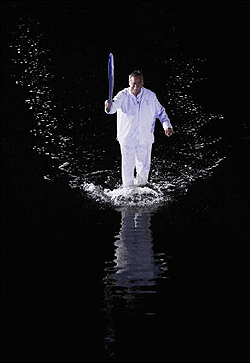
Ron Barassi carries the Queen's Baton walking on water across the Yarra River
... Link
There was I perched on the loo when I looked up into the mirror and just above my head sat an enormous spider - I mean it was at least two hand spans and to my mind it must have found some steroids somewhere to get to that size! I jumped off loo screaming, pants around my ankles still doing you know what! Terry came running and nearly killed himself laughing when he saw me struggling with said wet pants, etc trying to exit bathroom in a hurry. He fetched a glass, a rather large glass, in fact a wide mouth coke glass and managed to get said spider into glass but instead of waiting for me to hand him a piece of card to cover the glass he decides to jiggle said spider to the bottom. Said spider was having none of that and climbed up glass, Terry starts grunting and hopping madly around with said spider still clinging to glass. Terry drops glass and spider into loo (which I might add I didn't get a chance to flush!), as said spider climbs onto his hand Terry spends next 10 minutes fishing said broken glass out of loo (still not flushed) with bbq tongs (which have ended up in the bin!) Spider meanwhile tries to climb up loo and tongs. Terry eventually picks spider up with tongs and deposits said spider into bag and then puts spider and bag into bin. Spider not being outdone decides that a bag and bin is no place for a self respecting spider and commences to escape bag and bin and starts running all over bathroom with Terry in hot pursuit (meanwhile I'm making quick exit from bedroom swearing never to return unless he catches the beast!) Terry catches said big spider again with tongs, carefully takes him outside, and deposits him at bottom of garden. Said spider scampers off. Peace is restored, rest of glass from bottom of loo retrieved, loo flushed, bathroom floor washed and pants in washing machine - peace again reigns in white household. I now check bathroom wall for spiders before sitting on loo! Nothing like a peaceful evening eh!
As an aside, our next door neighbour mentioned that she had seen an enormous spider in her garden - wonder if it was our friend on steroids. Hope he decides tomake his new home next door!
... Link
(Or how to avoid summer's big bite - The story below was written by Kerry Cue on 21dec05 - just had to share it with you!)
WE Aussies are tough, but not in a wrestling-crocodiles-and-opening-beer-bottles-with-our-teeth kind of way.
We are tough because every summer we leave our suburban bunkers and venture into the great utdoors.
We might not venture far -- no further than, say, the cement-block barbie in the back yard.
But, still, we risk our lives as Australia boasts some of the most venomous and irritating biting beasties in the world.
And many live in our own back yards.
As if we Aussies didn't have enough worries already with our venomous snakes, spiders, fish, octopi and jellyfish.
Now we can add lizards to the list. Yes, lizards.
This year scientists at the Australian Venom Research Unit discovered many Aussie lizards have snake-like venom.
It may not be enough to kill you, but a lizard bite could certainly upset the rhythm of tossing the salad.
So you need some up-dated first-aid advice. You know, about snakebite.
The Red Cross recommends applying a pressure bandage, immobilising the limb and keeping the patient calm as you wait for the ambulance.
I'm not sure how you keep a patient calm with a 2m tiger snake hanging off their ankle.
Drop a copperhead in the middle of a yoga class and see how calm they remain.
However, the good news is that you don't have to kill the snake. It can be identified by its venom. There is also no need for tourniquets strangling a mate's vital bits and no more sucking venom out of a mate's dirty foot.
Most spider bites in Australia are not fatal unless, of course, you are driving a car or you are the member of my family who needs capsicum spray sedation at the mere sight of a daddy long legs.
The Red Cross recommends serious funnel-web type spider bites get the snakebite treatment. Lesser bites just need a pack of frozen peas and optimism like: "Nah, it wasn't a redback, mate. It was a sort of . . . ah . . . dunno."
But, don't panic. We now have the technology to ID arachnids.
This year British pub worker Matthew Stevens, 23, took a picture with his camera phone of the 13cm Brazilian wandering spider that bit him at work.
Matthew collapsed and was taken to hospital. The hospital faxed the pic to the Bristol Zoo and the anti-venom was delivered.
But can I offer two suggestions? If you do take a photo of the spider with your camera phone, tell the victim it is for medical purposes, not just to message your mates.
Then there is the european wasp, an aggressive buzzing, stinging beastie against which average Aussies are defenceless, not being able to defend themselves with a beer in one hand and a wilting paper plate in the other.
Wasps are attracted to sweet and fatty substances and to a wasp you look like a large well-dressed doughnut.
Bees on the other hand are attracted to hair spray, bright colours and perfume, so this summer sit some distance from your gaudily dressed and ageing aunt.
Apart from severe allergic, dial 000, reactions, the Red Cross recommends carefully removing the bee stinger and treating both bee and wasp stings with an icepack.
Mozzie, sandfly and ant bites are all acidic, so you can wash them with a weak solution of ammonia or carb soda.
If bitten by all three, just trim your fingernails and try not to think about it.
As for lizards, my 1969 St John Ambulance manual insists they can be detached by applying "a lighted match or cigarette to the mouth".
Theirs not yours, of course, but collecting 12 cigarette burns while detaching one lizard seems dumb.
I imagine simply jumping around like King Kong on speed would effectively detach a lizard. Then try frozen peas.
So, when you head into the outdoors this summer avoid bright clothes, perfume and eating sweet or fatty foods.
Use repellent. Watch out for creeping, crawling things. And try to relax and enjoy yourself.
... Link
In the morning, the land is refreshed, renewed and almost alive as the clouds hover and lift and hover again over the valley … and when the sun appears the land becomes golden.
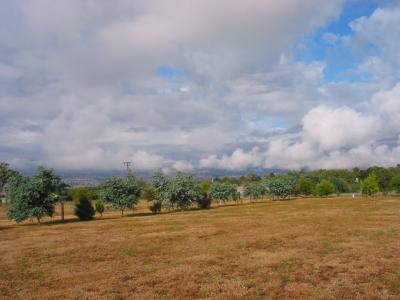
The warm sun bakes the earth. The land is pungent and scented and it almost breathes with the heat of the rich earth and the intoxicating scents of the grasses lying beneath the sun. I can almost feel the approach of rain, a fresh humidity in the air. The earth reveals itself in all its hidden sounds: the green leaves of the gum trees rustle tremulously under the wind; a coalescent, muffled soughing comes from the nearby forest
A Cockatoo’s screech mingles weirdly with the joyous singing of the magpie. I listen to the artless laughter of a kookaburra, and to the creak of a tree branch and the rustle of the eucalypt-scrented wind. Almost touching the earth with their double-pointed tails, swallows weave patterns in the air, and far, far off in the sky two eagles sail majestically. Wild ducks forage nearby and a drake calls hoarsely to his mate; far, far off, a cuckoo indistinctly and mournfully counts out its unspent years as small birds forage and chitter in the tree limbs above my head.
This land is filled with a marvellous and myriad-voiced sonority, of elemental life, of scents and perfumes …
... Link
Leaden-grey clouds hang in the sky. Two sunbeams stream momentarily through a rift, then the sky is enveloped with clouds and the wind turns colder. 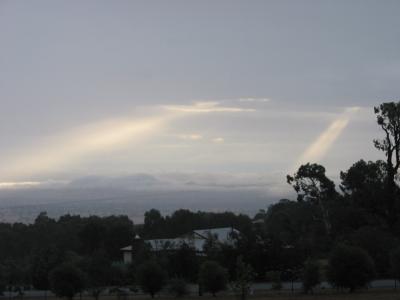
Pallid day-lightening flickers over the ground. A roll of thunder shakes the hanging cloud mass and lashings of rain begin to fall. The wind sends it running in dancing waves over the dry ground, over the roses wilting in the heat, over the dry grass. The rain revives the dusty leaves, and the dry grass gleams and the roses lift their heads again and their cloying scent rises to seep through the garden. The thirsty earth steams as it drinks drunkingly. A dove grey mist hangs over the ground.
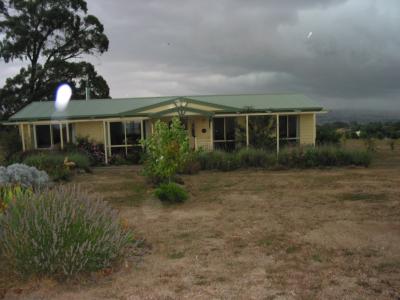
Bowed down with rain, the grass is bent to the earth. Frogs croak happily from the dam and nearby a magpie chorals exuberantly and a kookaburra, winging up, calls laughingly in answer.
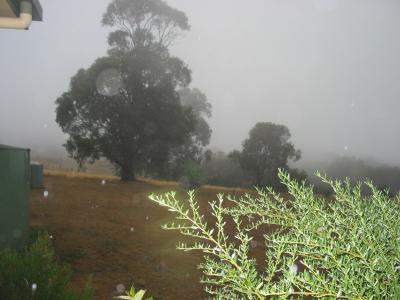
... Link
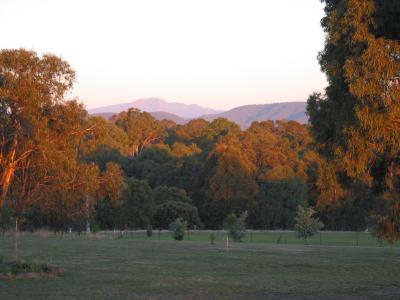
Night falls. Beyond the valley, beyond the green and gold gulf of forest, the stars glow in the bluish depths of the heaven. The sky is enveloped in gold, then pink. The sunset burns and sinks beneath the hills turning the mountains beyond purple. The hump of the moon emerges from the spreading horns of the gum trees. The shadows deepen against the land. It is so quiet, hardly a sound, just the grass whispering in the light breeze.
... Link
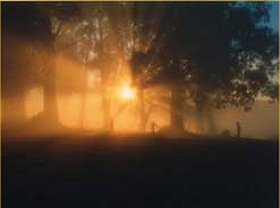
A redolent sunset slips through the trees and falls beneath the earth. The sight fills me with wonder as I sit poised with camera in hand. There is something inspiring in nature as the poets proclaim.
... Link
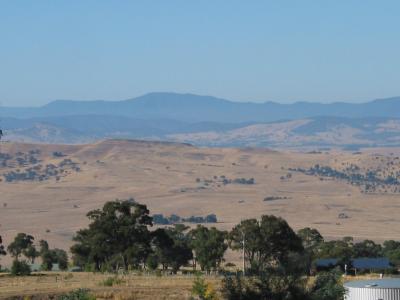
Before me, wrapped in a tender blue haze, the range of hills lay majestically silent. The sun streams down from the zenith beyond a thread of opal clouds. A heavy, oppressive aroma arises from the gum trees an grass. The countryside is dry - there is no green except for the trees and vineyard below. The valley below is yellow and in places the soil is being sucked up in the air in little dust devils. All, around, as far as the eye can see, is dry, illimitable space, quivering streams of haze, and on the horizon the magically intangibly azure Mount Buller, the summit clean of its attendent tugboat clouds and its flanks plae in the sunlight.
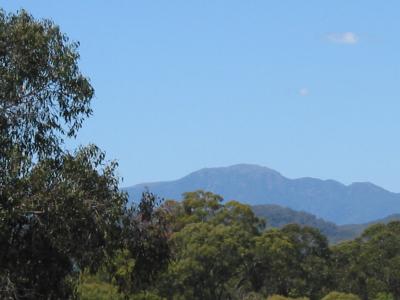
... Link
It's very dry now in the north east of Victoria. The green paddocks have turned yellow. The land is eucalpt scented. Cockatoos cry high and wild, their screams seemingly flung on the searing northerly wind which is like a burning furnace . No clouds cover the sky as the cockatoos rise up in their slow winged flight to circle and scream.
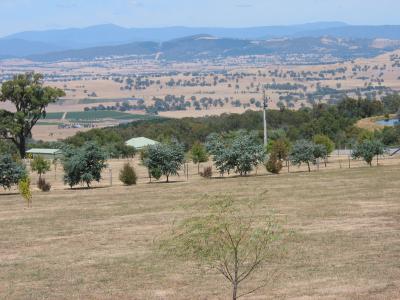
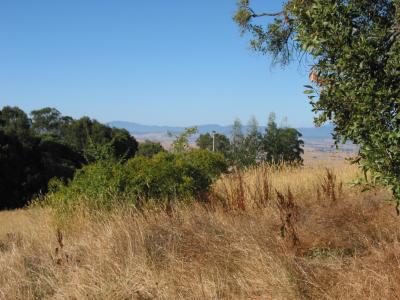
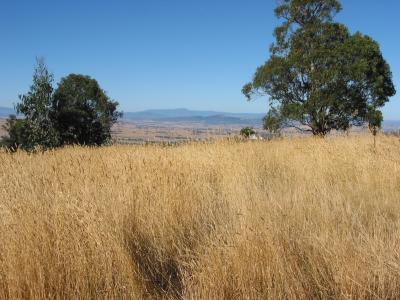
The dry countryside
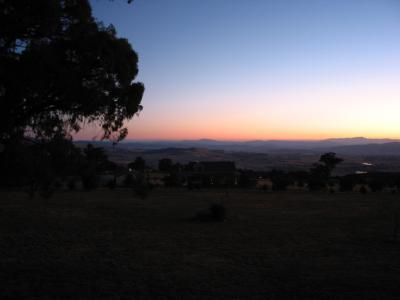
Sunset over the Delatite Valley
The dry paddocks cause grave anxiety and we scan the distant horizon for signs of fire. Australia has always had bush fires. Some of the terrible fires might not seem so appalling if they burn where there is no human habitation, if there are no people caught in the path of the flames, no gardens, that have been lovingly tended for years, destroyed. There will always be the tragedy of kangaroos with burnt paws, hind legs and tails, and of possums and Koalas burnt in trees.
The savegy of the fires in the last fifty years may have many causes. Possibly the dense pastures caused by the spreading of superphophate make the fires hotter, Possibly the Aboringies' slow fires kept areas of less inflammable bush, here, there, everwhere, and those areas stopped fires from becoming general. Possibly there has been often a combination of severe drought and careless burning off or a slasher hitting a stone and causing a spark (as in the case of the recent Yea fire), or the cycle of years where forked lightning and the dry thunderstorms combine with severe drought.
The extremely good organisation of country fire-brigades all though the closer-settled country has stopped many fires getting out of control, but one cannot but be beware that a vast general conflagration could occur, such as Black Friday, and Ash Wednesday, even with all the possible care being taken.
If you live in the country, surrounded by paddocks and State Forest you are aware of the inherent risk and dangers.
... Link
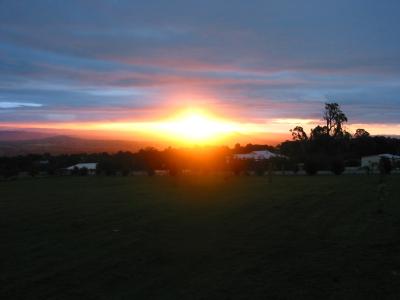
The air was magically still, although the lead-coloured overhead clouds were ragged from the storm. Over the hills the cloud had thinned away to long streamers of apricot and pale violet, tinged on the underside with jade. The trunks of the gum trees were washed with delicate shades of lavender and faded rose pink, and the long grass rippled with a long streak of molten gold. I drew in a breath. The sun just rested on the horizon. It was a perfect orb of brilliant falme-orange, except for the faintest flattening at its lowest margin.
Entranced, it was a moment for myself. The unearthly beauty stuck a shaft into my heart.
... Link
Sydney is a city imbued by the sea. It is a city as free and democratic as its sunshine and sea; well into its second century it is proud of its heritage of historical links with the earliest days of settlement.
There are certain aspects of Sydney, which will shine through all the centuries. Her fretted harbour, though it runs back only thirty kilometers from the sea to Parramatta, has a meandering shoreline ten times as long with scores of sequestered coves and beaches as lovely as the golden afternoons that so often lie upon it.
From thousands of homes, flats and offices in Sydney you may see sunlight reveling on the harbour water for most days and in the evenings, reflected lights twinkle and beckon.
Ferries constantly crisscross the harbour, ferrying tourists and locals alike. There are many Sydney-siders whom the morning and evening tranquility of the ferry crossings is as necessary as breakfast and supper.
Sydney is eclectic with its modern international architecture – the glass houses on stilts, the big rectangular buildings with a general unifying texture of glass and stone that reflect the pattern of light and shade, buildings that are outward viewing as well as upward looking.
The heavy steel arch of the harbour bridge, spanning the harbour, the Sydney Opera House with its soaring white sails so supremely beautiful in the sunlight, the bright Luna park face, the historical buildings that cluster around the harbour.
In the many parks and gardens, stairways have been cut through the brown or reddish sandstone to connect differences in level, which occur unexpectedly. Every step is a lookout. I particularly like the sudden gap of Moore Stairs looking down to the ferry boats of Circular Quay.
Darling harbour with its many restaurants and cafes is a place to sit to either drink a cold beer or sip a glass of wine or drink a cup of coffee and watch the world pass by. Take the monorail and ride above the rooftops of the stunning metropolis and over an arm of the glorious bay - past convention centers, soviet subs and impatient sharks. Sydney is a City to explore on foot, or by boat or by car. It is a City of hidden secrets and amazing views. It is a City that will continue to grow and change but the harbour will always be its constant.
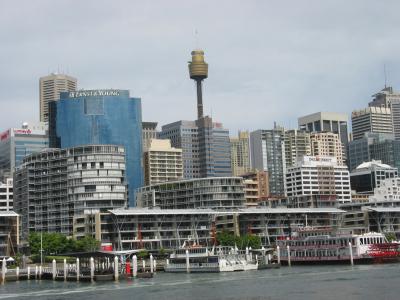
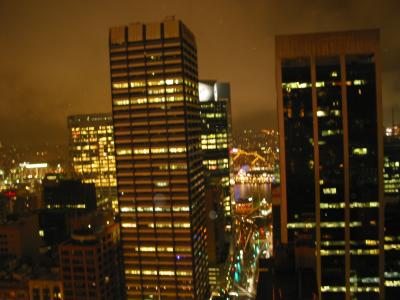
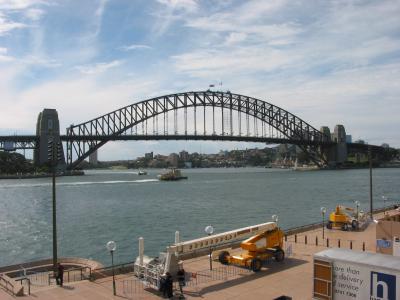
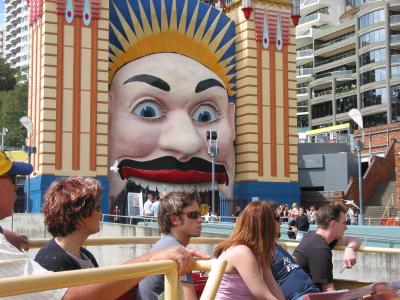
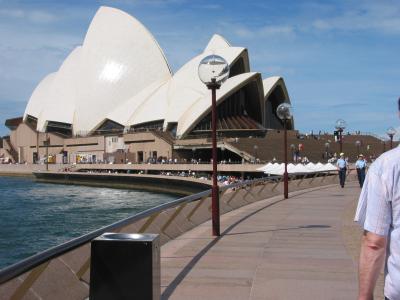
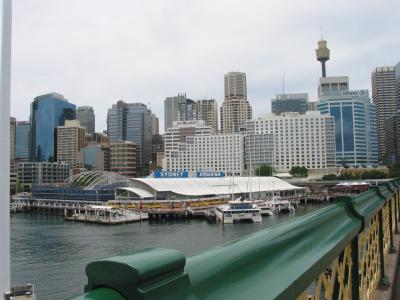
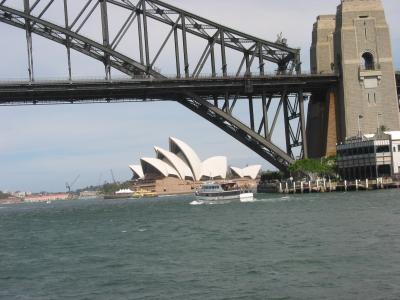

... Link
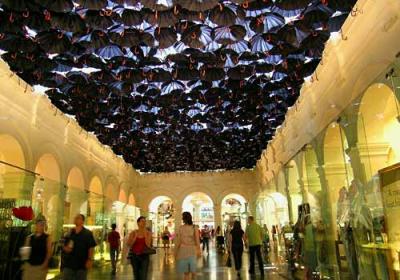
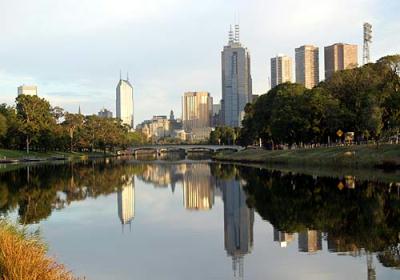
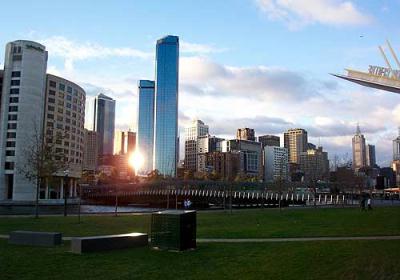
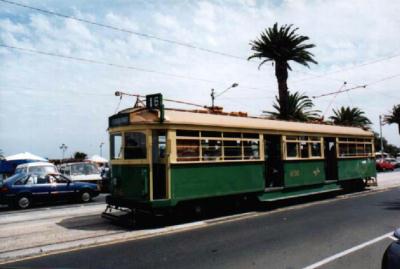
... Link
In Spring, the smell of the eucalypts, the smell of smoke in the evenings ... the beautiful early morning sunrises - so much a part of Australia. We've had some fine Spring weather and lovely sunshine in between showers of rain. The snow still occasionally splatters in the mountains and we still awake to cold frosty mornings. But each day the sun rides higher in the sky and its rays become warmer. Spring mists lay over the Delatite Valley in the early mornings. At dawn we might see the mountains and then the mist will rise and cover us. Black cockatoos cry eerily in the mist. Kookaburra's cackle and magpies warble - the beauty of Spring's sounds.
Rain falls and falls. The water rushes over the paddocks and finds its way into the ancient creek bed. The creek floods and spreads and shafts of sunlight fall through the heavy cloud, illuminating the creek and sheets of water. Our paddocks have become soft and wet underfoot.
Beautiful cloudy days come and go with cumulous clouds in the west, both white and blue black and the east is suffused with gold between layers of cloud. Light flows through those bars of cloud and send crepuscular rays across the sky. Rainbows form and reform. Ever changing lines and patterns, great hollows of dark blue sky, the valley below constantly changes.
... Link
The miraculous flaring gold of the wattles have lit the hills with a golden light as Spring approaches. Snow on the mountains gleams in the sunlight with Spring's glorious promise.
Days of dense grey mist, impenetrable and soaking fade away as the sun rides higher in the sky. The clouds clear and one can see the wide arc of the snow covered mountains.
In the early mornings, mist lies thick in the valley below and it becomes a mysterious inland sea lapping at one's feet. The snow mountains sail above it: the dark world of fog is below.
The first invisible haze of green over the willows appears. The red-brown buds begin to burst open to show a faint fold of green leaf. There is a sudden lightening of the spirts. The days of sun and light, of colours in flowers and in birds, and days of a vast choir of bird song at dawn are returning. - the green haze is the rebirth of the land.
Now as long bright days appear and the sun begins to ride higher, in the far distance a banner of white snow flares across the horizon and on moonlight nights the snow-covered mountains become silvered ghosts.
The first touch of Spring is like a gift of strength, a well of hope as the wattles burst into golden bloom, and the memory, of the imprisoned scent of wattles becomes a reality. The fragrence is in the air, drifting down to the house at night and winter begins to turn the corner into Spring ...
... Link
A tense, waiting silence enfolds the land. Then one white flake swirled and twisted down ... two ... three ... More and more were drifting, like upturned rose petals floating down. Our Tolmie garden was surrounded by flake-filled air. I looked up at the moving white snow in the grey sky, felt the benediction of the feather-light cold touch on cheeks and eyelids. Snow flakes had laid their touch in blessing upon my upturned face whilst I stood alone in the silence of the garden.
Steadily the snow began to coat the leaves of the gum trees. Yellow petals of early flowering daffodils showed above cups of snow. Out of the timeless, paceless silence and the snow-thick air, came the mournful cry of the currawong. My footsteps cut tracks along the driveway between the woodshed and the house.
The snow stopped falling by mid-day and the temperature rose. Then a bitter, cold wind sprang up from the South. The sky became clearer, brittle, cold blue. By evening, though clouds still lay over the ranges, the wind had blown the sky clear above us. A band of cloud lay down over the far range, stained deep, cold red by the sunset. Darkness closed down on the white hills and valley and by morning the snow was a barely imaginable dream.
... Link
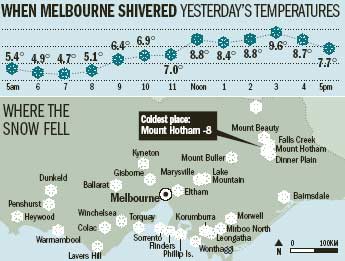
Still grey daylight filters through the curtains. Again, it is a day for the fierce heat of an ample log fire. The wind rushes and volleys against the house. Silvery rain sluices down turning to hail and then light snow. The air becomes quiet and still as the snow falls. The countryside is beautiful under the white mantle.
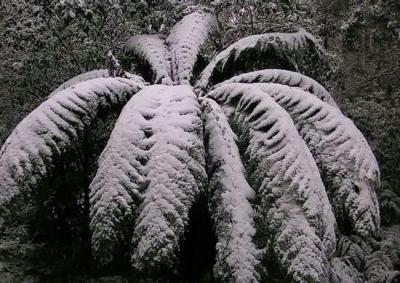
Yes, it was an exceptional day even in a state renowned for unreliable weather, according to the Bureau of Meteorology. A particularly intense cold front has passed through the south-west of Victoria late on Tuesday afternoon was the first warning sign of an unusual day ahead. The air had been forced up rapidly from polar regions and spread across the state, reaching the far east overnight on Tuesday. The speed and depth of the front meant it retained its intensity for longer than usual. The layer of cold air was between five and six kilometres deep, compared to an average shallow front, which would be about two kilometres deep and, by dawn snow had begun to fall in western Victoria.
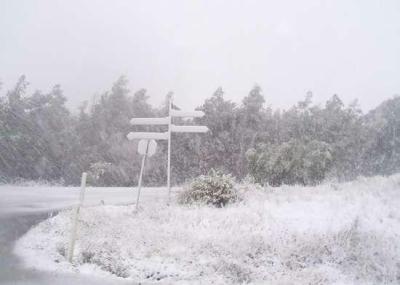
Snow fell at sea level and usually at this time of year, temperatures would be at freezing at 1500 metres to two kilometres above sea level. Today temperatures were at freezing only about 800 metres above sea level.
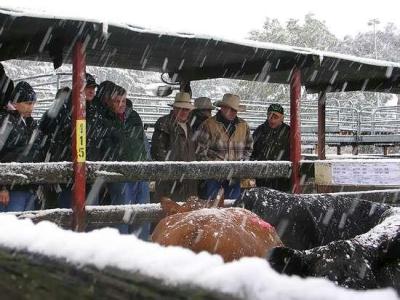
This is what caused the precipitation to remain frozen and hit the ground as snow rather than rain in areas that are more renowned for their beach and surf lifestyles.
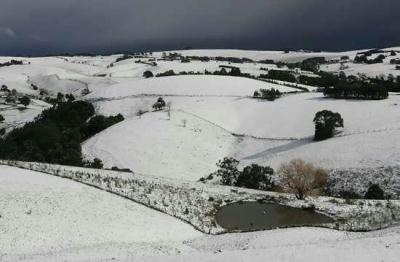
Snow fell at sea level for the first time since 1986, with falls at Apollo Bay, Ocean Grove and Torquay in the west, Phillip Island and Inverloch in the east and Seaford closer to Melbourne.
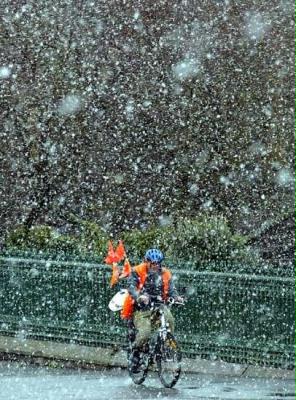
"It's certainly the coldest air mass we've had over us for the past 20 odd years," Australian Bureau of Meteorology senior forecaster Scott Williams said.
Melbourne's temperature dropped to a low of 4.6 degrees at 7.14am and reached only 10.4. The coldest spot in the state was Mount Hotham, which hovered between minus seven and minus eight all day.
The front extended across the nation's south-east, with falls in Hobart and Canberra, including briefly at Parliament House.
... Link
My husband is out of sorts. At most times of the year he is a person with a fairly pleasant temperament, given even to spurts of amiability. But at this time of the year, in the mornings especially, he is almost always out of sorts. His mood is largely attributable to his being so tired. He is tired because, this year, he is watching the cricket on television and England shares a huge time variance with Australia.
I am out of sorts. I am out of sorts because I,to, am tired, having been jolted from sleep, seemingly every night for days by my husband's exortations, shouts of encouragement and groans of deep disappointment - not from the marital couch, mind, but from the television room and with three matches still to be played I wonder how I will survive!
... Link
Outside, the winter days have grown muted, as if all colour has been bled from the world. The trees are bare and their naked limbs stretch to the sky. People huddle down drab streets, wrapped from head to toe in browns and grays of heavy woolens. It is a landscape done in shades of gray and black. Even the skies overhead are cloaked by flat, featureless colours - a massive blank slate.
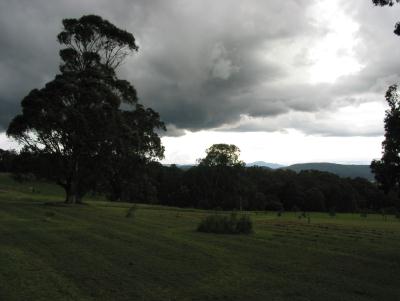
... Link
It is winter here in Victoria and in the mountains the snow falls thickly. it gathers in the fields and rises high agaisnt the enscarpments. The snow slows the world. The view blurs to nothing and then vanishes altogether as if it has been erased.

... Link
A most alarming thing happened the other day. I woke up in the morning, leapt with my customary gay abandon from the marital bed and headed for the bathroom. There, as it is my wont, I took stock of myself. Sure enough: stocky as ever. Everything in fact, on the surface at any rate, was as much the same state it had been the night before; reassuring testimony to the fact I have thus far treated my body, not as a temple, but as an amusement park.
Hang on. It became apparent, as my eyes surveyed the not inconsiderable contours of my body downwards from top to toe, that something was awry. What could it be? I looked again. Alors! I had aged. Overnight, just like that, everything just went squishy and out of focus. Boundaries between various features became disputed border areas. Noses flopped and cheeks sagged and chins wobbled, that sort of thing. I was just about to really panic when I realised I wasn't wearing my glasses - amazing what a pair of glasses can do!
... Link
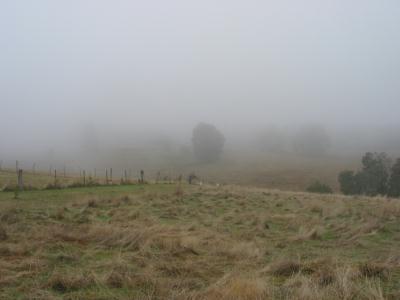
The day was improperly born. Blotches of wet fog obscured its shape, there were loose long sinews of mist that hung and made blind and confined the space. It was raining and not raining. The only sound was the steady splatter of moisture falling from the leaves to splash onto the damp ground. No birds sang. All was silence. Clutching a cup of coffee, I stood and watched the washed-out light that was wet and thin and like gauze drift between the trees. The stillness was palpable.
As the morning rose the wind carried swift clouds of all shapes across the sky. They crossed quickly over the valley below in an elaborate shadow play. Showers and drizzle came and went. The sky cleared and clouded and cleared again. Brilliant blue appeared and disappeared in the spaces between the clouds. The light kept changing. A shower of rain fell through piercing sunlight and then vanished.
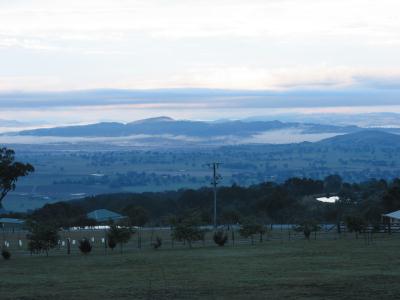
When the rain passed the birds chorused and flew, and flickered and darted. The song of the magpie mingled in the air like a thread of music. The laughter of the kookaburra and the scream of the parrot - sounds of Australia. The simplicity of light and grass and birds and falling drizzle was all there. The land is a thing of beauty. Earth, stone and water mingling.
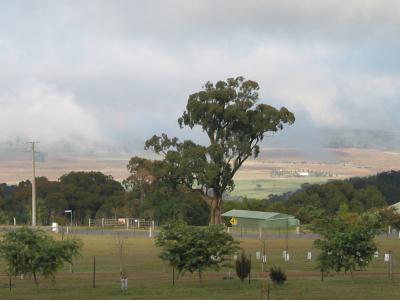
... Link

Mansfield, this year, right now, as winter surrrounds the hills and beyond. Don't imagine for a moment the town of Mansfield shining in July with snow and frost. Forget the postcard images in your mind of an picturesque snowy village. This is an outback town. A street of shops. Estate agents and cafes, gift shops and ski hire shops and pubs. A small grocery mart with its rows of oranges and apples and flowers. The butcher with its prize winning local meats and sausages. The clock and the police monument acknowledging those long dead. The smell of the street, of stone, of the people, of the dogs, of the entity that can only be known as a town, a thing both dead and alive.

Imagine a street frozen in time. Imagine its inhabitants, the young local men in jeans, RJ Williams boots, thick jumpers and glowing faces - cattlemen, the gray-suited bald man with glasses (an estate agent?) shivering, a steaming coffee cup in hand, the handsome and the ugly, the elfine woman laughing - happiness, the roadside cafes, people sitting under the awnings, the brightly clad skiers blown by icy gusts of wind; the masks and the faces they reveal; the ski clad family with ski bags and piles of shopping; they fill their car and then wander down the street, peering into the shop windows, their ski coats fluttering, their hats pulled down over ears. The pick-up trucks parked along side the four wheel drives about to head to the snow. A barking farm dog, the crisp, cold air, the breaths of fog that pour like smoke from the mouths of people wandering the chilly town street. This then is Mansfield, a town alive, Winter and Summer - gateway to the mountains ...

... Link
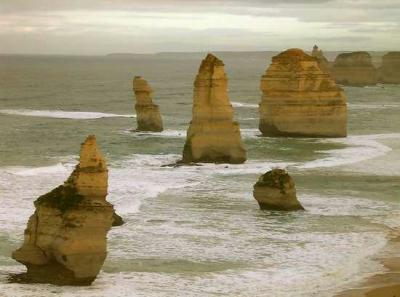
ONE of the famous Twelve Apostles collapsed into a heap of rubble yesterday, destroying in seconds a landmark nature had taken 20 million years to create.
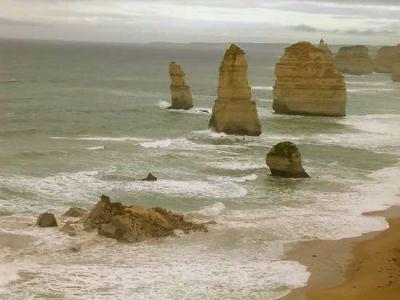
The 70m-high limestone monolith off Victoria's Great Ocean Road crumbled shortly before 9.20am, in a relatively moderate swell, after a huge crack opened up on the seaward side.
Only eight Apostles now remain. Yesterday's collapsed pillar - the second of the group, looking northwest from the main viewing platform - was lying as a forlorn pile of rubble last night just metres above sea level.
"One minute the sea stack, which geologists say could have formed 6000 years ago, was there. Then it was gone, crumbled into the sea.
Bernie Joyce, from the earth science department of Melbourne University and a member of the heritage sub-committee of the Geological Society of Australia, said waves would have been chipping away at the sea stack by a few millimetres every year.
"Some of it is very soft - a combination of limestone, sandstone and fossils," Professor Joyce said. "It was always going to happen but rain or a severe wave attack could have brought it on."
Professor Joyce said the sea stack that collapsed was like a chimney sitting on a flat platform under the sea. The collapse would have been triggered by a vertical crack sending several tonnes of rubble swirling into the ocean.
A similar phenomenon occurred at nearby London Bridge, a popular tourist attraction in the Port Campbell area, about 10 years ago.
In that case, the arch of the bridge connecting the mainland collapsed, turning the formation into an island from which a couple had to be plucked by helicopter.
Despite their name, there have only ever been nine apostles. Now there are eight.
Professor Joyce said other Apostles were also likely to disappear over time. But for every one that fell down there were more being formed as the coastline retreated.
Andrew Gleadow, professor of Earth Sciences at the University of Melbourne, said the Apostles were formed after the tips of headlands were separated from the mainland, eroded by the sea. "A headland can be cut off and become a new little island ... sometimes the erosion begins as sea caves," he said.
Professor Gleadow said it was only a matter of time before the remaining eight Apostles crumbled into the sea. "They certainly haven't got millions of years left ... I would think it would happen every 1000 years or so.
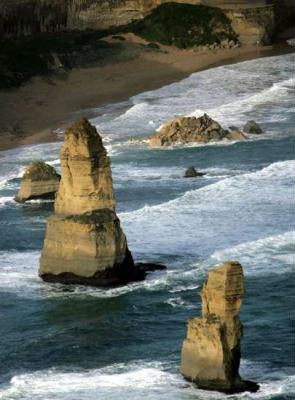
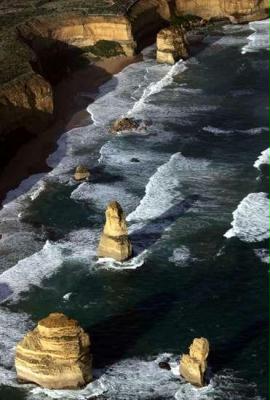
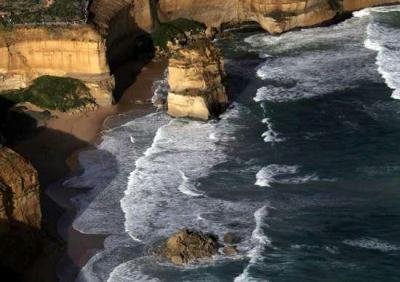
... Link
Now, while I do not wish to give the impression that my figure is in any way grotesque I must disclaim that it is by any means the sort of figure which nips easily over walls, streams, rocks or steep pathways! Agility is not and never has been my strong point!
My figure though sturdy and being somewhat rotund for anything but a moderate degree of athleticism can still thank goodness manage to navigate ski slopes.
No matter how hard I try to diet I just cannot seem to shake those extra pounds that have crept up upon me in the last five years or so. I blame it on my five foot three inch figure and I tell myself had I been blessed with an extra three inches or so I would look a lot slimmer ...
... Link
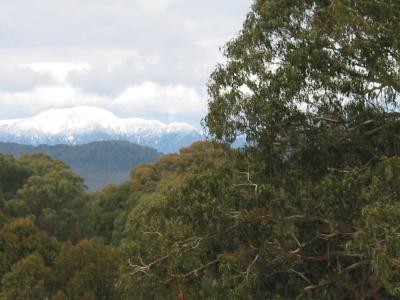
The wind roared and plunged frenziedly through the trees, shrieking and wailing with theatrical violence. It caught me off guard and almost succeeded in unbalancing me. The steady relentless rain that makes the grass and the trees and even the hills look tired and defeated stung my eyes, my face and my legs, it trickled through my hair and seeped in rivulets down my neck.
Walking the property, it is wonderful to feel the sodden earth beneath my feet. To see our creek gurgle and tumble over the rocks and to pour into the National Park which abounds our property.
During the week the rain came down in torrents but by Friday morning there seemed to be a faint prospect of the day developing into a reasonably fine one. The stream still gushed exhilaratingly. The hills loomed darkly through a billowing mantle of cloud, the tawny washed hills stretched interminably and a chill eddying breeze whispered a message to the trembling grasses.
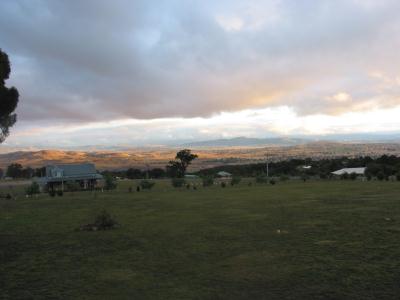
The grey blanket of sky being swept northwards revealed elusive shafts of sunlights which patterned the fields with pools of gold. Gradually the cloud lifted and wintry peaks appeared, hastling one another for a glimpse of the morning's sun which transforms the sky into a rippling canopy of blue and gold.
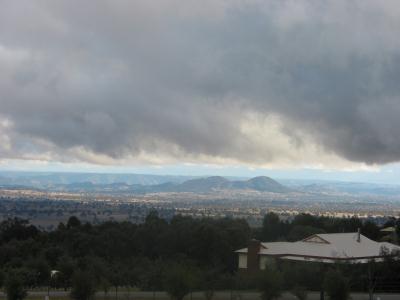
And Mount Buller could finally be seen, in all its wintry glory, for the first snows had fallen to cover its peak. The ski season has begun ...
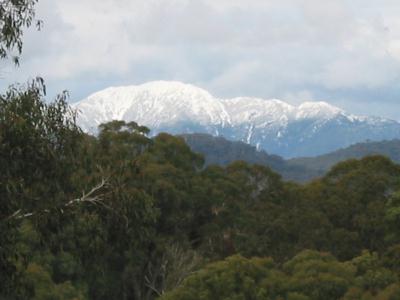
... Link
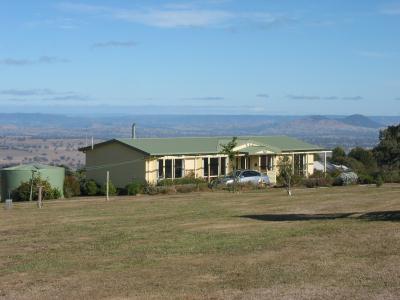
Winter has not yet arrived and our little house continues to dream in the winter sun.
... Link
They are curious of us as we are of them.
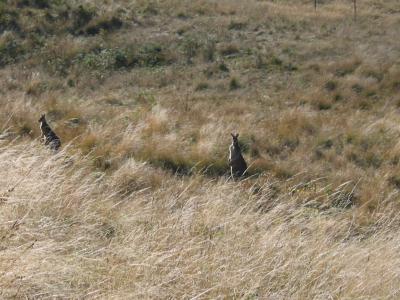
They're off!
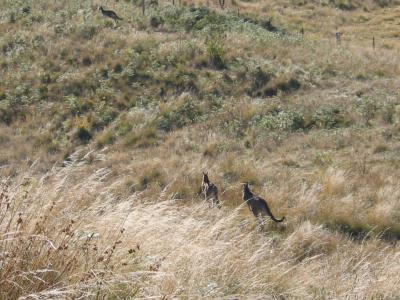
... Link
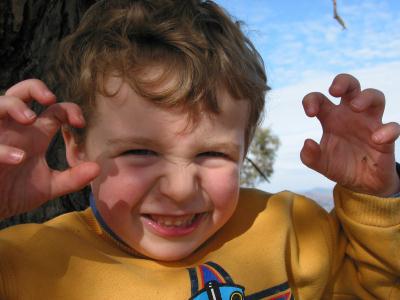
... Link
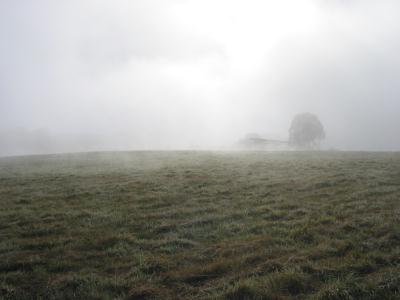
It is a chilly, windless morning with a soft feathery feeling in the air: mist, yet so fine floats. It clings to everything; the grass looks bowed down by it and the trees look cobwebbed by it, their leaves dark and glossy drip jewels. The mist, so eye-catching on the glittering cobwebs, is cold and clammy on the skin. The mist becomes a mysterious inland sea, lapping at ones feet, the trees above, mist below wreathing amonst the houses and trees.
It becomes a golden June morning, the faint haze of sun above, and in the hollows of the valley mist lies. There is a smell of frost in the air but none properly in the ground yet, and the two small oak trees still hold their yellow leaves. Flying low overhead, their wings outstretched a flight of screaming cockatoos disturb the silence.
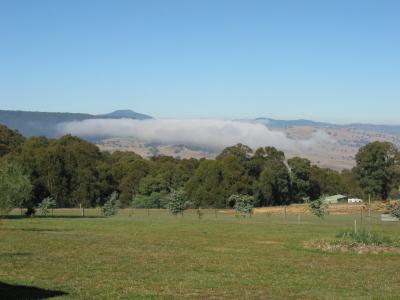
In the tree tops, magpies warble their strange poignant bell-calls. The distant hills stretch for miles. Lofty and tangled woods traverse the hillsides reaching towards Mount Buller.
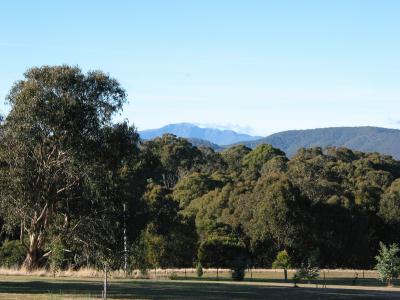
... Link
The Melba Highway threads its way to the High Country and plains through farmlands and small towns. Past vineyards glutted with dark red grapes, olive groves and moss trunked orchards already ravished, the last windfalls rotting on the ground. Climbing upwards through eucalpt forests towards rolling country where trees stand in lines or cluster on hill tops. Four wheel drives, huge trucks bearing fruit, or groceries or logs flash by. The road skirts the shoulders of hills, crosses brooks which bubble like apple-cider and flowing rivers. Pale grasses by the wayside nod with ripe seed heads. Trees thin, then dwindle and disappear. The sky opens out. Cattle ponder and huddle in the shade under scattered trees and flocks of sheep wander in huge paddocks. Overhead the soft hug of sky pales into mist at the margins. Dandelion-puff clouds race past, their fleet shadows rolling like ocean waves across the land. A crisp wind scatters leaves across the road that churn and turn as the traffic passes.
The highway cuts through a narrow gap between hills, and spread out before and below lays a valley scattered with homesteads, roofs and windows glinting in the sunlight. The road slopes steadily down - more and more often it crosses bridges, the wheels clack clacking over the wooden spans. Trees crowd closely to the edges and partly conceal the sun. Shadows congest. Livid clouds can be seen swarming in from the northeast covering the face of the sun. The car smoothly churns up the miles. Lake Eildon crossed with only a scattering of puddles glinting in the sunlight below. Its lake bed bare under the bridge. We pass the two sentinel hills, the Paps. Rounding a knoll, the sudden, majestic sight of Mount Buller. The dying sun appears it colours the mountain with glowing rose, hazed with somber gold. Motes of sunlight pelt down like sparks. Nearing Mansfield, a sparse shower of rain passes over, leaving an archway of pastel colours in the sky. Mists rise languidly over fields. Through them the haunting images of trees loom.
Slowing, we drive through Mansfield with its many bright cafes, gift shops and inviting pubs dotting the highway. We veer left onto the Whitfield road and then right onto Barwite Road and left again onto the Old Tolmie Road and start climbing upwards again as dusk sets in. The car breaks suddenly throwing me forward and back in my seatbelt. It swerves to avoid a wombat which lumbers across the roadway. We look back to see him slowly moving on, hoping that he will find his way across without further mishap. Our ears pop as the car climbs higher. We turn right and below us in the dusk the tumbling dark outlines of the mountains can just be seen as the first stars flicker in the sky. I climb out the car, stretch and open the gate. We have arrived.
... Link
Situated on our rural property near Mansfield lie the foundation stones of an original bluestone rabbiters hut which was built between 1830 and 1870. Its history is long forgotten, gone with little trace and it leaves me with an aching sense of loss. Three trees planted behind the hut still stand sentinel and dog roses run rampant nearby. I stand and listen to the wind crooning in the trees and think of bygone days when others would have stood in this same spot looking at the early morning fog blanketing the world far below, hearing the songs of birds on the morning breeze and the tok-tok-tok of the frogs from the nearby spring. Strung between the branches of a tree, hang spider webs that, having caught the dew drops, shimmer like starry nets, refracting the light, now glinting like diamonds. The dew, so eye-catching on the webs, is cold and clammy on the skin. Motes of sunlight break though the curling white vapors of fog. Trees seem to be floating free of the ground, suspended on a sea of pale cloud. Something huge can be heard thumping over the ground. Like a gigantic monster it appears out of the fog, jumping the fence and shooting across my line of sight before disappearing amongst the trees. A kangaroo. A ragged line of ducks wing their way across the landscape. Magpies warble their strangely poignant calls. I close my damp notebook wondering if I have captured in words a moment in time …
... Link
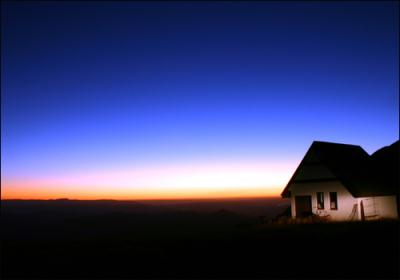
The sun was past its zenith, sinking toward a wintry horizon. It threw a pale gleam over the distant hills casting a play of light and shadow. Through a frayed rent in the clouds a crescent moon rode like a ghostly canoe, translucent. A flock of screaming cockatoos crossed the sky. Their cries, echoed and re-echoed. The last echo of their screams hung over the valley as their cries passed into the distance and tranquility returned. Nothing reached my ears but the fading staccato plaint of magpies on the wing, the sough of the wind bending the long grasses until their tops almost kissed the ground. When the red sun sank into the mists on the edge of the world the horizon was singed brownish orange, fading to the palest pink, blending to dilute, ethereal blue, which in turn shaded gradually to the deep, rich hue of the night sky overhead. Birds uttered uneasy, sporadic sounds from the trees as darkness settled over the land.
... Link
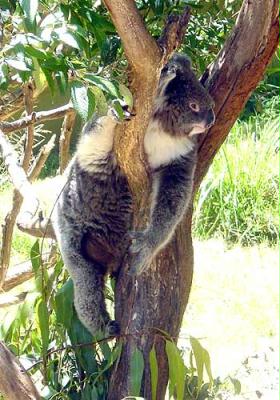
If only we could all hang around like this fellow!
... Link
Life changes. There is no first moment; no single word or place from which the change begins. The threads can always be traced back to some earlier moment. Nothing is fixed but patterns are woven and rewoven as we move along the different pathways of life.
In a half forgotten past and a future just glimpsed I change lanes. The last year has been a sabbatical, to travel and renovate the house and to escape a corporate environment from which, I now understand, I took no pleasure in. Bored with my job, tired of the predictability of each day - I had wanted out; wanted freedom from the drudgery of daily life. So I jumped and I my life has shifted and changed lanes and I have emerged from this last year knowing that I now have the opportunity to write.
Here in Mansfield, there is so much to claim the eye. The eagles aloft hovering for a breathless instant. The dappled quilt of fields, their grasses and grains swept by the same tides of air. Velvet woodland creeping up the flank of hill on whose pinnacle snow will soon alight. Sun and cloud-shadow drifts across the valley below me. Laptop on my knees I consider the blank page before me awaiting the first words of the fiction to be created from the private storybook in my head. Where will they lead me. So many words to write. Bare bones of a story. Sounds, nuances light to be fleshed out. And the story once exhumed will take on a life of its own. A kaleidoscope of words, blind runners rushing backwards and forwards, tapped across a page to become a beginning ...
... Link
Last modified: 8/20/10, 9:57 AM
| February 2026 | ||||||
|---|---|---|---|---|---|---|
| Sun | Mon | Tue | Wed | Thu | Fri | Sat |
| 1 | 2 | 3 | 4 | 5 | 6 | 7 |
| 8 | 9 | 10 | 11 | 12 | 13 | 14 |
| 15 | 16 | 17 | 18 | 19 | 20 | 21 |
| 22 | 23 | 24 | 25 | 26 | 27 | 28 |
| April | ||||||


